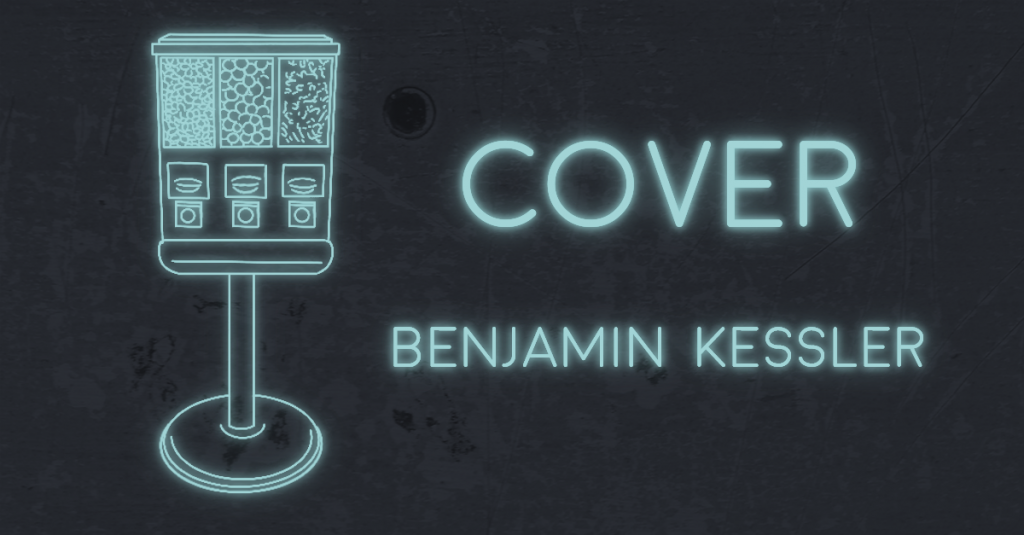The father is accompanying the daughter to the mall. The daughter wants very much to get her ears pierced, and while the father thinks she is too young, he has consented. Though only after making the daughter pull weeds from between the spaces in the driveway concrete. The father doesn’t simply give the daughter everything she wants. He makes her earn it, and this makes him feel like a good parent. He enjoys very much feeling like a good parent, especially in front of the mother.
The daughter wants candy from one of the turnstile vending machines and the father gives her a quarter on the condition that she promises not to eat the candy all at once. The daughter says she won’t and runs off to the island where all of the machines sit, their scratched domes filled with stale sweets in muted primary colors.
The father sits on a concrete bench and watches as the daughter inspects each machine, stooping over and choosing carefully the candy she wants. The daughter insisted on wearing her favorite green jacket, even though it is permanently stained by grape juice and the mother has labeled it “home only.” But the father isn’t concerned. When he saw the daughter bound down the stairs and reach for it off the hook he gave her a sly wink, as if to say our little secret.
People mill in and out of stores. Teenagers laugh inside a photo booth. There’s so much to see. Another little girl in a green jacket runs laps around the candy machines. The father hasn’t had his driver’s license back for very long and he’s excited to be out of the house. He wouldn’t tell the daughter this, but the father would have taken her to the mall regardless of whether or not she picked out the weeds to his specification. They may even go get fried chicken after, or see a movie. The father doesn’t have a job anymore. The father and the daughter could stay out all day long.
Being at home is just so difficult. It has become tremendously boring. The father feels as though he has read every book he owns, twice. Then there are of course the reminders: the now empty cabinet above the sink, the lowball glasses sealed away in the Goodwill box in the basement, the car with the busted front end sitting for months untouched in the garage. To get to the mall the father borrowed the mother’s car, though not without subject to that admonishing look she gave while handing him the keys. But everything is better now. Just look, the father says, holding his hand before him and spreading his fingers. No shakes.
The daughter has made her decision: chalky sour candy shaped like tropical fruit. She slides the quarter into the slot and turns the metal dial, the father watching, anticipating the sound of gear teeth in conversation. But there is instead another noise. A familiar sound, though not one the father has ever heard personally. He knows it only by reputation. The other mall shoppers must know it as well, because in an instant everyone is frenzied, running and screaming toward the array of double doors, overlarge glossy shopping bags swinging wildly from their hands.
But the father is smarter than them. Though he’s never been in this situation before he knows from evening news that the danger may well be waiting at the exits. So he launches himself toward the candy machines with speed he wasn’t aware he had, scoops the daughter up by the waist, and sprints into the nearest store. Once inside, soft music piping in over the speakers, he ferrets out a hiding space within a circular rack of blue jeans. He then pulls the denim closed like a curtain and holds the daughter close. They are safe, and the father again feels like a good parent. In the main hallway many are still in a panic, calling out. A fire alarm has been pulled and it wails.
The father tells the daughter that everything is going to be okay, then turns her around. But as he does so he discovers it is not the daughter. No, it is the other little girl with the other green jacket. She has fair skin and braided blonde pigtails. She looks nothing like the daughter, really, and to the father’s surprise his first thought isn’t for the daughter’s safety, but rather how the mother will react when she learns what has happened. She will assume the father had been drinking. How else could he make such a mistake? How else could he be so foolish and irresponsible?
And what has happened? Nothing so sinister. What the father, and everyone else, don’t know is that the sound, like a director’s clapboard inciting a hectic scene, was simply a sandwich board falling onto its face.
The father stares at the little girl who is not the daughter. The little girl is about to speak but the father puts a single finger to his lips. The father thinks about the daughter. He wonders if, in another store, in some makeshift shelter-in place much like his own, another father is staring at the daughter. The father takes out his cell phone, thinks about calling the mother, telling her that he is okay. And the daughter, she will ask? Fine, the father will respond, because he doesn’t know she isn’t.

